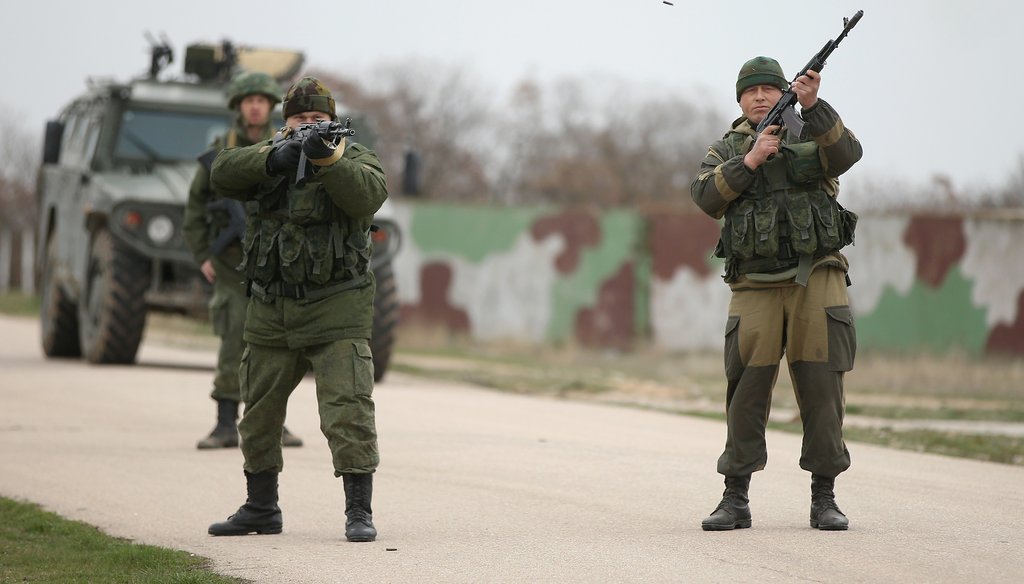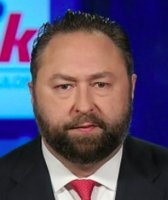Get PolitiFact in your inbox.

Troops under Russian command and in unmarked uniforms fired their weapons into the air on March 4 to warn Ukrainian troops to turn back at the Russian-occupied Belbek airbase in Crimea (Getty Images).
The events happening in Ukraine are unfolding quickly and so is the political rhetoric. Here’s a fact-checkers guide to the crisis in the Eastern European country.
CLAIM: "Crimea was part of Russia "until 1954, when it was given to the Soviet Republic of the Ukraine." -- U.S. Rep. Mike Rogers, R-Mich.
The focal point of the crisis in Ukraine is Crimea, an eastern Ukrainian peninsula located on the Black Sea. It’s connected to the rest of the country by a small strip of land. Out of its 2 million residents, about 60 percent consider themselves Russian -- the highest concentration of Russians in Ukraine. Although the territory belongs to Ukraine, Russia stations part of its Black Sea fleet in Sevastopol as part of a pre-existing agreement between the two countries.
Rogers expressed concern about Russia’s interference in the area to Fox News Sunday host Chris Wallace.
"I would believe that Russians would love to see the Crimea as part of the Russian Federation," he said. "It was there until 1954 when it was given to the Soviet Republic of the Ukraine at the time. I think they’d like it back. It’s strategic for them militarily and economically."
For much of the past 300 years, Crimea was part of Russia or the Soviet Union. In 1954, Russian Premier Nikita Khrushchev transferred what was then called the Crimean Oblast to Ukraine. It’s often reported that it was a gesture of goodwill from Khrushchev, who had Ukrainian roots.
When the Soviet Union collapsed in 1991, many observers expected President Boris Yeltsin, the new president of the Russian Federation, to take Crimea for Russia. But he didn’t bring it up during negotiations with Ukraine. In 1997, the two countries signed a treaty allowing Russia to keep its naval fleet in Crimea.
CLAIM: "The Russians didn’t wear uniforms when they came in" to Ukraine. -- MSNBC host Chris Matthews.
Over the past week, reporters for the New York Times, Reuters and Guardian wrote of Russia unloading troops in the Crimea region of Ukraine.
The news outlets described Russian-speaking, armed soldiers unloading from armored vehicles whose service uniforms "bore no insignia" though their vehicles featured Russian military plates of the country’s Black Sea force. The troops "swarmed the major thoroughfares of Crimea," wrote the New York Times, shutting down the area’s main airport and surrounding government buildings.
In a March 4 news conference, Russian President Vladimir Putin denied Russian troops were occupying Crimea as he said that Russia would only resort to military action "for the protection of the Ukrainian people." Putin chastised the U.S. government for interfering in Ukraine’s affairs like a scientist with rats.
"There are many military uniforms. Go into any local shop and you can find one," Putin said of the so-called pro-Russia "local defense forces," according to a translation in the Times.
But foreign journalists have challenged Putin’s claims, often just by asking talkative, possibly bored soldiers if they are Russian military. Guardian Moscow correspondent Shaun Walker tweeted the soldiers were "forced to keep up ‘volunteer’ charade," though one "chatty chap" admitted he was from Russia "to defend against ‘terror’ " in a video.
Experts we consulted said there’s no doubting the troops are Russian.
"It’s clear these are Russian special forces in terms of their performance and in terms of their bearing," said Ariel Cohen, a senior research fellow in Russian and Eurasian studies at the Heritage Foundation.
As for Matthews, he should have made clear that he was talking about identifying characteristics on the soldiers’ uniforms. So we rated that claim Mostly True.
CLAIM: The new Ukrainian government "introduced a law abolishing the use of languages other than Ukrainian in official circumstances." -- Russia Today.
The question of why Russian troops are in Crimea is a matter of debate itself.
While it would be easy, and maybe even largely accurate, to see Russia’s moves in the Crimean Peninsula as a power-play pure and simple, Moscow gives other reasons. All of them have to do with protecting Russian citizens or ethnic Russians in Ukraine.
Russia Today, a Kremlin-financed American cable network, advanced this theory, saying that the new Ukrainian parliament tried to abolish Russia as an official language of Ukraine.
The Ukrainian parliament did vote to repeal a 2012 law that allowed for more official languages in parts of the country. But the repeal vote was not signed into law by the Ukraine’s interim president.
And more importantly, Crimea -- the center of the crisis currently in Ukraine -- has long held a special status whereby both Russian and Ukrainian could be used in official business. The recent vote would not have changed that, experts told us.
So, in short, speaking Russian is still okay. This claim rated Half True.
CLAIM: "The (Russian) ruble is already going down." -- U.S. Secretary of State John Kerry.
While many say there is little the United States can do to stop Russia from its incursion into Ukraine, Kerry said economic sanctions could work.
Kerry said over the weekend that he had been on the phone with his counterparts among the G-8 nations.
"Every single one of them are prepared to go to the hilt in order to isolate Russia with respect to this invasion," Kerry said. "They’re prepared to put sanctions in place, they’re prepared to isolate Russia economically, the ruble is already going down. Russia has major economic challenges."
On the question of the ruble, Kerry is correct. But it’s partly because the Russians wanted it that way -- so we rated Kerry’s claim Mostly True.
In the early part of 2013, the ruble was worth 3.3 U.S. cents. Today, its value has tumbled by 15 percent, to 2.8 cents. A little less than half of that fall came in January as the situation in Ukraine deteriorated.
There is no question that the violence and political turmoil in Ukraine took a toll on the ruble. Russian banks have about $28 billion in loans in the country. Before the Russian troops moved in, investors were already worried. Last week, two of the largest banks in Russia said they would suspend any new lending in Ukraine.
But the ruble’s decline has deeper roots. In 2010, the Russian Central Bank announced it wanted to get out of the business of setting the ruble’s value on the international market. It had in mind a gradual glide path for the currency’s fall, and in October, it gave the ruble even more leeway to drop further. The country’s economy grew less than 2 percent last year, and it has struggled to keep inflation in check.
"The ruble got pretty overvalued in the big energy boom from 2001-08," said Mark Adomanis, a management consultant and contributor to Forbes. That hurt Russian manufacturing and letting the ruble fall potentially could help.
"With a weaker ruble Russian goods become more competitive on international markets," Adomanis said.
CLAIM: Says she made an "accurate prediction" that if Barack Obama were elected it would encourage Russia to invade Ukraine. -- Former Alaska Gov. Sarah Palin.
We also heard this week from Palin, who was doing a victory lap of sorts over a prediction she said she made about Russia in 2008.
"I could see this one from Alaska. I'm usually not one to Told-Ya-So, but I did," she posted on her Facebook page. Within a few days, more than 71,000 people had "liked" the post.
Palin went on to describe her "accurate prediction," quoting herself from the 2008 campaign trail:
"After the Russian Army invaded the nation of Georgia, Sen. Obama's reaction was one of indecision and moral equivalence, the kind of response that would only encourage Russia's (Vladimir) Putin to invade Ukraine next."
The outside experts we reached did not find her words in 2008 to be a clear prediction, but they give her credit for accurately highlighting a place where a crisis in fact emerged.
Experts, however, did not agree with the logic behind her claim and said there's a lot more to the story -- namely a history of America avoiding confrontation with Russia in its direct spheres of influence.
Ultimately, whether Obama's actions somehow encouraged Putin and Russia to invade Ukraine is something Palin cannot prove.
So we rated that claim Half True.
CLAIM: Says Vladimir Putin once said, "The breakup of the Soviet Union was the greatest geopolitical tragedy of the 20th century." -- Former U.S. ambassador to the United Nations John Bolton.
Putin, a veteran of the Soviet spy agency called the KGB, made the comments Bolton cites in an April 2005 state of the nation address to the country’s top politicians and parliament. A version is available in English from the Kremlin archives. Putin’s words vary depending on the translation, but the idea remains the same.
From the Kremlin: "Above all, we should acknowledge that the collapse of the Soviet Union was a major geopolitical disaster of the century. As for the Russian nation, it became a genuine drama. Tens of millions of our co-citizens and co-patriots found themselves outside Russian territory. Moreover, the epidemic of disintegration infected Russia itself."
The Associated Press translation is a little differently, subbing "catastrophe" for "disaster," and calling the breakup the "greateast geopolitical catastrophe of the century."
That language is a little more in line with what Bolton said. Whatever the word choice, it’s clear Putin believed there were problems created by the breakup of the Soviet Union.
What’s less clear is what Putin meant by it.
Mr. Putin: Operative in the Kremlin, a 2013 book by Fiona Hill and Clifford Gaddy of the Brookings Institution, addresses the "often misquoted line" about the demise of the USSR:
"Most references to this line have suggested that Putin was bemoaning the loss of the communist economic and political system," the book reads, "but Putin has since frequently underscored that he was talking about the collapse of the Russian state itself."
Gaddy elaborated in an interview with PunditFact, saying Putin is not eager to re-establish the USSR, partly because it would be costly for Russia, which subsidized many Soviet countries during that era. He does, however, want to make sure surrounding countries are not used against Russia.
Gaddy said Putin does not see Ukraine as a prize, as Bolton suggested on Fox News, but as a potential liability and realm for anti-Russian activity.
"His nightmare has long been that Ukrainian instability would be used to sap Russia’s attention and strength, or worse — that it would be used to entrap Russia into intervening militarily and getting bogged down," Gaddy said. "The nightmare is coming real."
We rated Bolton’s claim Mostly True.
CLAIM: The Ukraine Orange Revolution in 2004 "was the first color revolution." -- Conservative pundit Bill Kristol.
Kristol recently tried to advance the idea that the United States wouldn’t be in this geopolitical pickle if it did more to help Ukraine when it first tried to move toward the West in 2004.
But in describing his position, Kristol, a conservative political pundit, got the timeline of the so-called "color revolutions" wrong. He said Ukraine was the first color revolution in 2004.
But experts said the "Rose Revolution" in Georgia came a year earlier. While the revolutions are called the color revolutions, they’re not always explicitly identified by a color, historians said. (The Rose Revolution, for instance, is named after the flower.)
Our Sources
See individual fact-checks.


































